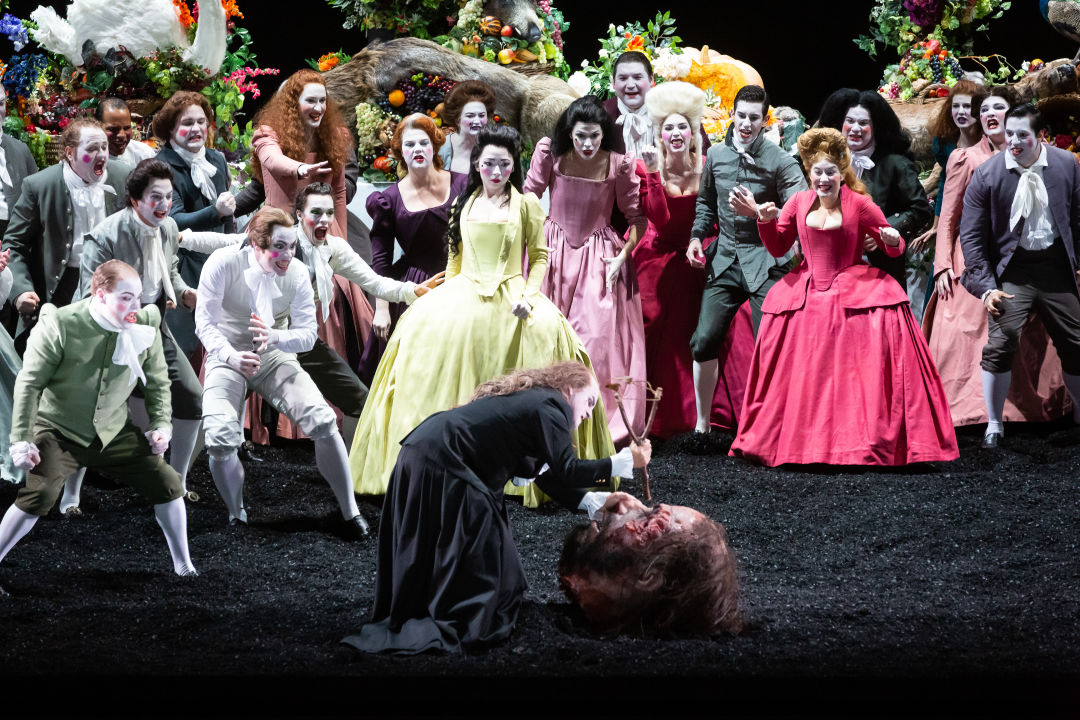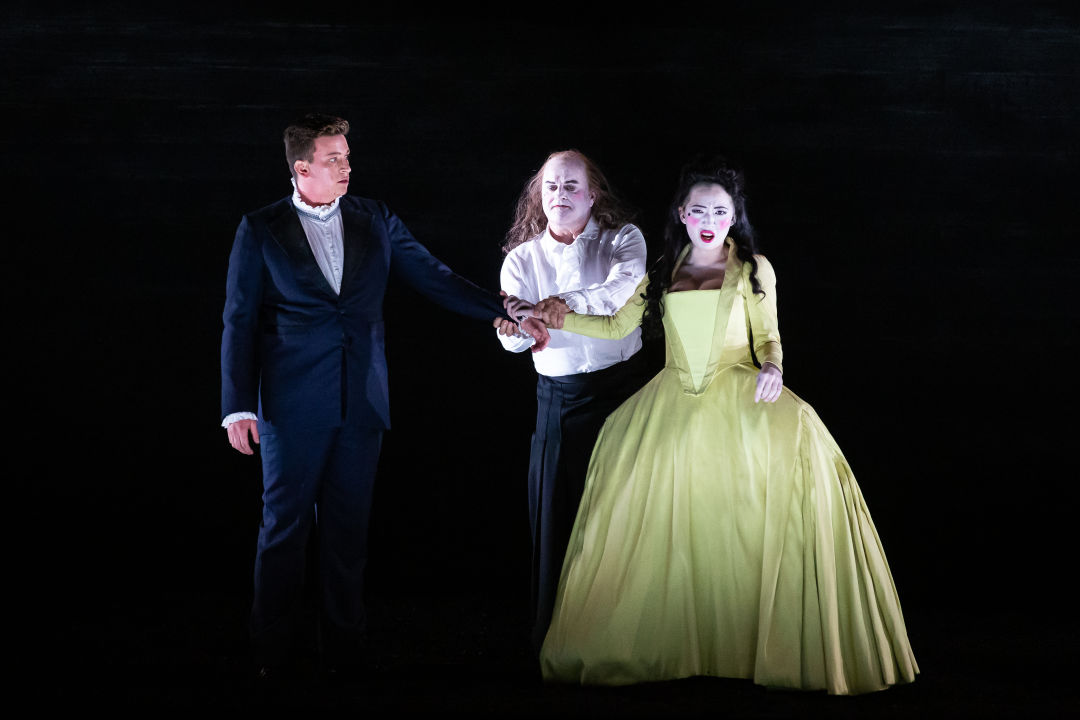This Story of a Jealous King is Not to Be Missed

Christopher Purves as Saul attacks the head of Goliath while the HGO Chorus watches.
Image: Lynn Lane
Houston Grand Opera’s production of Handel’s Saul is a unique treat, a surprising blend of old and new. Saul breaks from HGO’s usual fare in two directions at once: It presents much older music than typically heard at the Wortham with an experimental approach that is decidedly current.
In its 65-year history, HGO has presented just a handful of Baroque operas—most recently Handel’s Giulio Cesare in 2017. Baroque operas can be a difficult sell to modern audiences due to their repetitive structure, a ceaseless string of Da capo arias. But Saul wasn’t originally an opera. In early 18th-century England, operas couldn’t feature a Biblical subject, but Handel knew there was a market for religiously themed works. His solution was the English oratorio, an unstaged production of arias and choruses that told a Bible story. Ironically, the world’s best-known oratorio, Handel’s Messiah, is uncharacteristic of the genre; its libretto is purely scripture and its soloists don’t portray specific characters. Saul, on the other hand, is truly an opera in disguise, telling the story of Israelite King Saul’s descent into jealousy and madness as young David emerges as his heir apparent.
This is the North American debut of Saul as an opera, reviving the critically acclaimed Glyndebourne Festival staging of 2015. In its journey from the church to the theater, Saul brings with it two advantages over a typical Baroque opera: it is sung in English, increasing its accessibility to a Houston audience, and it features extensive polyphonic choral writing that shakes up the repetitive aria structure. HGO’s chorus is an asset to any production, but Saul elevates it to top billing. They sing Handel’s exquisite choral writing with clarity, passion, and at times, overwhelming strength. They manage all this while performing complex choreography that bedazzles the audience.
As the curtain rose, there were the 40 members of HGO chorus, dressed in 18th-century wigs and frocks, perched on a long banquet table stretching the width of the stage covered in a victory feast. The image was so spectacular, so unexpected, that the audience broke out in applause.
As the chorus sings “How Excellent Thy Name,” breaking from their frozen pose into anachronistically modern dance moves, it becomes clear that this production has dispensed with religious reverence. The setting has been moved to Handel’s day, and the chorus has become a mob of fans, fawning over their new hero, the young David played by countertenor Aryeh Nussbaum Cohen. It’s no wonder why they admire him; at the young age of 25, Cohen has a voice of warmth and purity that yielded an angelic quality to his performance. He handles the florid melismas of each aria with total ease. As the first act continues and all the characters literally sing his praises, it appears the show might have been better titled David.

Aryeh Nussbaum Cohen as David, Christopher Purves as Saul, Pureum Jo as Merab.
Image: Lynn Lane
Therein lies the problem for King Saul, commandingly portrayed by Baritone Christopher Purves. As David’s star rises, Saul is driven to raging jealousy, ordering his son Jonathan to murder David. Purves’ powerful voice captures Saul’s anger and desperation that turns into madness. In a memorable second act scene, Saul visits the Witch of Endor to summon the spirit of the prophet Samuel. Purves convincingly alters his voice and demeanor to play both characters at once.
The rest of the cast is strong, too. Soprano Pureum Jo shines as Merab, Saul’s eldest daughter, who protests when Saul offers her to David in marriage. In the first act, she displays a great sense for physical comedy, her facial expressions and gestures exhibiting just enough royal snootiness as she dismisses David’s advances. In the second act, her stunning performances of two somber arias demonstrate her considerable expressive range. Soprano Andriana Chuchman is excellent as Michal, Saul’s daughter who loves David from the beginning and eventually gets to marry him. Her voice blends beautifully with David’s in their love duet at the end of the first act. Tenor Paul Appleby’s Jonathan is earnest in love for David. Tenor Keith Jameson plays several smaller roles combined into one quasi-narrator that takes the form of ghoulish jester. His garishly long nails and fiendish cackle lend a fairy-tale air to the production, though its intended meaning was not entirely clear.
Like HGO’s concurrent production of Rigoletto, Saul nails the essentials: great singing, beautiful craftsmanship, and splendid playing from the HGO orchestra, directed by Patrick Summers. But Saul offers a rare experience: a virtually unknown score in a musical style beloved by many (with virtuosic organ solos from Rice University’s Ken Cowan), an outsized role for the marvelous chorus, and a modernist approach to choreography that reframes the source material. Some might find the experimental elements in the second act confusing or off-putting (the audience was squirming at the portrayal of the Witch of Endor), but they’re bold and thought-provoking, ensuring that this is production is not to be missed.
Thru Nov. 8. Tickets from $20. Wortham Theater Center, 501 Texas Ave. 713-228-6737. More info and tickets at houstongrandopera.org.




